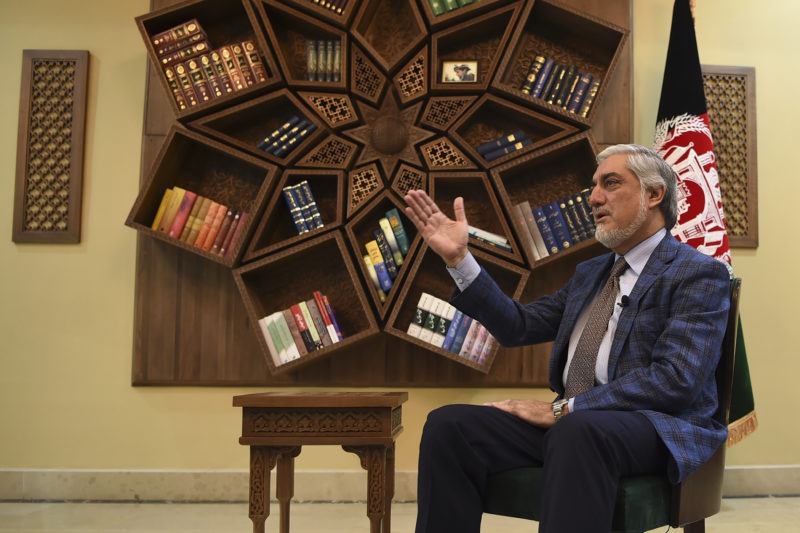Afghan chief executive slams president’s ‘wishlist’ peace plan
Afghan Chief Executive Abdullah Abdullah gestures during an interview with AFP at the Sapedar Palace in Kabul (WAKIL KOHSAR)
Kabul (AFP) – Afghanistan’s Chief Executive Abdullah Abdullah dismissed Tuesday a new peace proposal by his election rival President Ashraf Ghani as an unrealistic “wishlist”, and again questioned the validity of thousands of votes from recent polls.
US President Donald Trump in September ended year-long talks with the Taliban amid ongoing insurgent violence, leaving Afghans wondering what comes next in the gruelling conflict.
Ghani’s team last month released a seven-point proposal meant to build on those talks and bring an end to Afghanistan’s 18-year-old war with the Taliban.
While some observers have praised aspects of the detailed proposal for its scope, they question whether certain elements — including a call for a month-long Taliban ceasefire before talks resume — are feasible.
“To be honest, nobody has taken that so-called seven-point plan as a plan… it’s rather a wishlist,” Abdullah said in an interview with AFP.
“Nobody is taking it seriously — neither the people of Afghanistan, nor anybody.”
The US-Taliban negotiations centred on the Pentagon pulling troops in return for Taliban security guarantees, but drew scorn from Ghani’s government, which was systematically cut out because the insurgents do not recognise the administration.
Abdullah said it is imperative for any future talks to include negotiators from the Afghan government, be it led by him or by Ghani.
Any negotiating team “has to be inclusive. Government has to be a part of that”, Abdullah, 59, said in his sprawling official compound next to the presidential palace in the centre of Kabul.
Abdullah is locked in a bitter election race with his next-door neighbour Ghani.
The two rivals squared off in a first-round vote on September 28 and election officials have repeatedly delayed announcing initial results, citing various technical problems.
In 2014, Ghani and Abdullah fought a close and angry race that sparked widespread allegations of fraud and saw the US step in to broker an awkward power-sharing agreement between the rivals under a unity government.
Abdullah’s position, not mentioned in the constitution, was created to end ongoing disputes that threatened political collapse.
– 2014 repeat? –
There are signs this year’s election risks a repeat of 2014, with both Ghani’s and Abdullah’s camps alleging fraud.
But Abdullah, who has previously said he believes he secured the most votes, said he would “absolutely” respect the result of recent polls — if the process is fair and transparent.
On Monday, his team said problems remained with about 300,000 of the 1.8 million votes that the Independent Election Commission has said are valid.
The IEC had failed to communicate to the public what is happening in the counting process, Abdullah said, and “they have not explained it transparently to our representatives… more transparency is needed.”
This year’s vote is supposed to be the cleanest yet in Afghanistan’s young democracy, with a German firm supplying biometric machines meant to stop people from voting more than once.
But Abdullah said problems remain even with these high-tech votes, claiming that photos attached to some ballots had been taken from fake identity cards, and not actual voters.
Already, nearly a million of the initial votes cast have been purged owing to irregularities, meaning the recent election saw by far the lowest turnout of any Afghan poll.
With Afghanistan’s war the overarching concern, presidential candidates’ policy positions were often drowned out by US-Taliban talks, and for a while it looked like the election would get shunted aside to make way for ongoing negotiations.
When asked how he differs from Ghani, Abdullah said the president has proven himself to be a divisive figure who failed to live up to his promises, including his pledge to root out the rampant corruption endemic across the Afghan government.
He also accused Ghani of prioritising his grip on power over striving for peace.
In a statement, Ghani’s office said the president’s peace plan had “clear objectives” towards a sustainable peace and pointed to a historic, three-day ceasefire last year as proof he can get results.
Ghani’s team also highlighted his corruption reform efforts, and his peace efforts “that will unify us, not fragment us”.
Disclaimer: Validity of the above story is for 7 Days from original date of publishing. Source: AFP.


